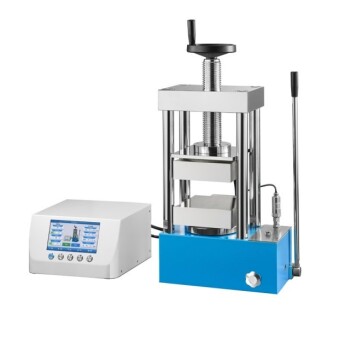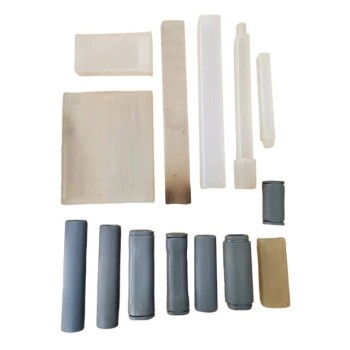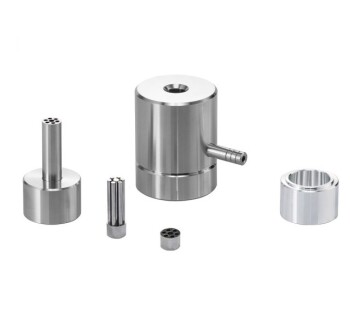At its core, Warm Isostatic Pressing (WIP) offers versatility by creating a unique processing window between cold and hot methods. It combines moderate, precisely controlled heat with uniform hydraulic pressure, allowing for the formation of complex powder material components that cannot be processed at room temperature but do not require the extreme conditions of hot pressing.
WIP's versatility isn't just about using heat; it's about using the right amount of heat to alter the properties of the pressing medium and the powder. This precise thermal control, combined with uniform pressure, enables the creation of dense, uniform parts that are otherwise difficult to manufacture.

The Core Principles of WIP Versatility
To understand why WIP is so adaptable, you must look at its three fundamental components: its unique temperature range, its method of applying pressure, and its level of process control.
Bridging the Gap Between Cold and Hot Pressing
Warm Isostatic Pressing occupies a critical middle ground between Cold Isostatic Pressing (CIP) and Hot Isostatic Pressing (HIP).
It is the ideal choice for materials with special temperature requirements—those that need more malleability than CIP can provide but would be damaged or unnecessarily over-processed by the extreme heat and cost of HIP.
The Role of Uniform Isostatic Pressure
The term isostatic means that pressure is applied equally from all directions. This is the central mechanical principle of the process.
WIP achieves this by placing the powder material inside a flexible mold or "envelope die." This sealed mold is then submerged in a liquid medium, which is pressurized. The fluid pressure acts uniformly on every surface of the mold, eliminating the density gradients and potential weak points common in uniaxial (single-direction) pressing.
The result is a highly uniform density distribution throughout the final component, which is critical for predictable performance.
The Power of Precise Temperature Control
The "warm" aspect is the key differentiator. A heat generator maintains the liquid pressure medium at a stable, elevated temperature, typically up to a few hundred degrees Celsius.
This controlled heat serves two purposes. First, it can change the properties of the powder itself, making it more plastic and easier to compact. Second, it ensures the liquid medium has the correct viscosity to transmit pressure effectively.
This precise temperature management ensures that every part produced is consistent and meets the required specifications.
How WIP Achieves High-Quality Components
The combination of uniform pressure and controlled heat makes WIP a preferred method for industries like aerospace, automotive, and manufacturing, where component failure is not an option.
Critical Processing Parameters
Success in WIP depends on the precise control of three variables: temperature, pressure, and time.
By carefully managing these parameters, engineers can fine-tune the metallurgical properties of the material to achieve desired performance characteristics like strength, hardness, and final density.
Eliminating Voids and Defects
Because pressure is applied from all sides simultaneously, it effectively squeezes out air pockets between powder particles. This process minimizes or eliminates internal voids, resulting in a dense, solid "green" part that is less prone to cracking or failure during subsequent processing steps like sintering.
Enabling Complex Geometries
The use of a flexible mold and a fluid pressure medium allows for the formation of intricate shapes. This includes components with undercuts, complex curves, or varying wall thicknesses that would be impossible or prohibitively expensive to produce with rigid dies.
Understanding the Trade-offs and Limitations
While versatile, WIP is not a universal solution. Being an objective advisor means acknowledging its operational trade-offs.
Temperature and Pressure Ceilings
WIP operates in a "warm" range. It cannot achieve the full theoretical density for certain high-performance alloys or ceramics in a single step. For these materials, WIP is often a preparatory step before a final sintering or Hot Isostatic Pressing cycle.
Tooling and Cycle Times
The flexible molds are often consumable and can be more complex to design and handle than the simple rigid dies used in other pressing methods. Additionally, the process of heating, pressurizing, and de-pressurizing the system can lead to longer cycle times compared to faster mechanical pressing operations.
Material Compatibility
The process is ideal for polymers, waxes, and powders mixed with a binder that softens or flows at elevated temperatures. It is less suited for materials that see no benefit from moderate heat or those requiring the extreme temperatures of HIP for full consolidation.
Making the Right Choice for Your Goal
Selecting the correct pressing technology requires a clear understanding of your end goal.
- If your primary focus is cost-effective densification of simple powder shapes: Cold Isostatic Pressing (CIP) followed by sintering is often the most economical and established path.
- If your primary focus is forming complex shapes from polymers or binder-treated powders: Warm Isostatic Pressing is the ideal solution, as the heat improves powder flow and pre-sintered ("green") strength.
- If your primary focus is achieving maximum theoretical density in high-performance metals or ceramics: Hot Isostatic Pressing (HIP) is the necessary choice, as its high temperatures and pressures work together to eliminate all porosity.
By understanding these distinct capabilities, you can select the isostatic pressing method that directly aligns with your material, complexity, and performance requirements.
Summary Table:
| Aspect | Key Details |
|---|---|
| Temperature Range | Moderate heat (up to a few hundred °C), bridging cold and hot pressing |
| Pressure Application | Uniform isostatic pressure from all directions for consistent density |
| Process Control | Precise management of temperature, pressure, and time |
| Key Benefits | Enables complex geometries, eliminates voids, and ensures high-quality parts |
| Ideal Materials | Polymers, waxes, and binder-treated powders |
| Limitations | Not for extreme temperatures; longer cycle times and consumable tooling |
Ready to enhance your material processing with Warm Isostatic Pressing? KINTEK specializes in lab press machines, including automatic lab presses, isostatic presses, and heated lab presses, tailored to meet your laboratory needs. Our expertise ensures you achieve precise control, uniform results, and efficient production of complex components. Contact us today to discuss how our solutions can benefit your projects and drive innovation in your industry!
Visual Guide

Related Products
- Automatic High Temperature Heated Hydraulic Press Machine with Heated Plates for Lab
- Automatic Heated Hydraulic Press Machine with Hot Plates for Laboratory
- 24T 30T 60T Heated Hydraulic Lab Press Machine with Hot Plates for Laboratory
- Laboratory Manual Heated Hydraulic Press Machine with Hot Plates
- Heated Hydraulic Press Machine with Heated Plates for Vacuum Box Laboratory Hot Press
People Also Ask
- How does using a hydraulic hot press at different temperatures affect the final microstructure of a PVDF film? Achieve Perfect Porosity or Density
- Why is a heated hydraulic press essential for Cold Sintering Process (CSP)? Synchronize Pressure & Heat for Low-Temp Densification
- Why is a heated hydraulic press considered a critical tool in research and production environments? Unlock Precision and Efficiency in Material Processing
- What role does a heated hydraulic press play in powder compaction? Achieve Precise Material Control for Labs
- How are heated hydraulic presses applied in the electronics and energy sectors? Unlock Precision Manufacturing for High-Tech Components



















